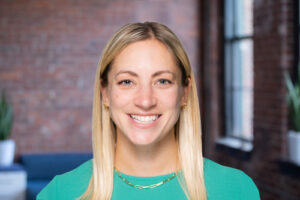Andrea Kowalski recently joined 1upHealth as Chief Product Officer, responsible for leading the company’s product strategy and driving continued product enhancements. She brings over 15 years of experience in healthcare technology, including recent roles at Tebra (formerly Kareo) and athenahealth, along with numerous industry awards, including being recognized among the Top 25 Women Leaders in Healthcare Software and the Top 25 Software Product Executives. She was also a founding member of Chief Boston, a private network for female executives and leaders across industries. We recently interviewed Andrea to discuss what brought her to 1upHealth, what she’s tackling first from a product perspective, and the role of AI in healthcare, among other topics.
company’s product strategy and driving continued product enhancements. She brings over 15 years of experience in healthcare technology, including recent roles at Tebra (formerly Kareo) and athenahealth, along with numerous industry awards, including being recognized among the Top 25 Women Leaders in Healthcare Software and the Top 25 Software Product Executives. She was also a founding member of Chief Boston, a private network for female executives and leaders across industries. We recently interviewed Andrea to discuss what brought her to 1upHealth, what she’s tackling first from a product perspective, and the role of AI in healthcare, among other topics.
What brought you to 1upHealth?
I’ve always been really passionate about healthcare in general and trying to make it better. I firmly believe that technology can help us improve healthcare in the United States and really make all of our lives much better. I’ve been in healthcare tech for about 15 years and I’ve always been on the provider side. When I first heard about 1upHealth, I was really attracted to the fact that they were solving this fundamental problem within the healthcare space. There is limited sharing of data, and while that’s hurting the entire system, ultimately it’s hurting us all as patients. I was really excited about joining 1upHealth because the company and its technology are really helping improve the experience for everyone.
Have you personally experienced data challenges in healthcare?
I think of myself as an educated health consumer, and I still face the challenges. I was recently at the doctor trying to figure out when my last tetanus shot was and couldn’t find the information. I called around to my previous doctors’ offices. I tried (and failed) to log on to the patient portals. Then I found out I had to write an actual letter requesting my records and either fax it (I don’t have a fax machine) or mail it and wait. I thought, “why is it so difficult to get access to my own information?”. I feel like I hear stories like this on a daily basis, which continues to reinforce why we’re doing what we’re doing at 1upHealth. Data access is just so important to the overall healthcare experience.
What gets you excited to come to work everyday?
I feel like we’re at an inflection point for data exchange in the healthcare industry. We’ve been talking about interoperability for as long as I can remember and slowly, but surely it’s happening. Especially now, with the new CMS Interoperability and Prior Authorization regulations acting as a catalyst for how we improve, how we get there. I just see so much potential for how we can continue to ride this wave and drive more change. What I get truly excited about is seeing the benefits of all that data sharing and the infrastructure for patients and their families. They are more empowered on their healthcare journey, and it’s amazing to see 1upHealth’s mission of “better healthcare for all” playing out in real time.
What are some of the challenges you see with data exchange?
I think part of the challenge is, not just the lack of technology, but sometimes the fear of sharing the data among the different parties. And, on the provider side, they have access to so much information. On one hand, you see some sharing, but at the same time, they don’t have time to go through all that information. So I think one of the interesting things that we need to solve is not just the sharing, but also making it easier for providers to consume the data so they can deliver better care.
What’s the role of artificial intelligence (AI) in all of this?
I think AI has so many applications within healthcare and I’m excited to see those come to life. I do think AI can play a big role in digesting a lot of information and picking out important pieces. I also think AI can really help with communicating information in a more patient-friendly way so people can better understand what’s going on in their healthcare. AI can also play a key role in reminding patients to go get their yearly mammogram or colonoscopy. Finally, at the population level, AI can help us understand the important trends – faster.
What are some of your initial priorities on the Product side of the house?
First, we’re continuing to improve our leading 1up FHIR Platform to meet data exchange and computing needs across the entire healthcare ecosystem, including payers, providers, and digital health companies. We’re also going to bolster our 1up Patient Connect solution, which digital health companies are clamoring for. In addition, we’re actively working to improve and further develop our product suite to support the CMS Interoperability and Prior Authorization final rule. This includes Patient Access, Provider Access, and Payer-to-Payer Data Exchange, along with Prior Authorization (more information coming soon on that). Finally, we’re looking to build partnerships that increase value for our customers, with a marketplace being our ultimate goal. We’ve got a lot of momentum, and I’m super excited for all the great things on the horizon.

